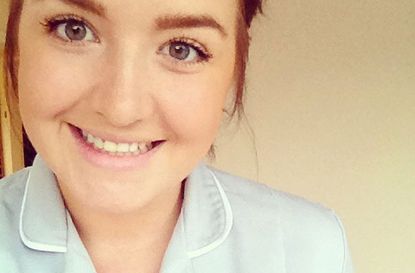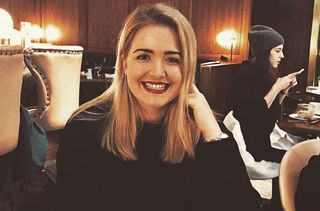'It's not just cuddling babies' Trainee midwife opens up about the realities of life on the labour ward
From babies born in car parks to birth plans going out the window


Midwives play such an important role in most women's birth - but is it the rewarding, joyful job that we imagine, or is it a gruelling task that doesn't receive the thanks it deserves?
Here, Daisy Earle, from Nottingham, who is just about to qualify in her chosen career, opens up about why she chose such a challenging role, and the highs and lows of life around labour...
I always knew that I wanted to work with people.
A lot of people said to me 'you'd make a really good nurse', but I didn't really want to do nursing. One of my family friends is a midwife, so I went along and did lots of placements at hospitals; I quickly realised it was something that I really wanted to do.
I love knowing how things work - I'm from a rural area and grew up watching lambing, so maybe that's where it comes from! Labour and birth are so fascinating, and even when you qualify, you're still learning new things every single day.
Thankfully, the first birth I ever saw was really nice and normal - it was amazing, but it did feel surreal - like watching something in slow motion, or seeing it on TV. It gets tougher when you see things like instrumental births, with interventions like forceps, because that's an emergency situation.
Caesarean sections can also be stressful situations - we rank them in categories from one to four, one being the most serious. When that's the case, everything has to be done within 30 minutes from the decision being made to the baby being born. You've got to get a woman prepped for theatre, sanitised, cut her open and get the baby out, so 30 minutes really isn't that big of a window.
GoodtoKnow Newsletter
Parenting advice, hot topics, best buys and family finance tips delivered straight to your inbox.
Some of the best births I see are water births. The hospital I work in has an amazing birth unit where everyone has pools in their rooms; it's just such a nice atmosphere and the woman's just doing it all for herself, she's so involved in the labour. The midwife's just there as an overseer, and the woman is completely absorbed.

One of the things about being a midwife is that you've got to consider the path that each woman wants. You get women that come in and they have no idea what they want, they're just going to go with the flow, and then you get women that come in with a 10-page laminated birth plan. Midwifery guidelines say care in labour should be 1-1, but that care can be really hands on - supporting, giving massage, talking to them throughout - or it could literally be stood in a corner watching her get on with things and making sure that everything's going as it should.
Of course, sometimes you don't get the path you chose - we've had babies born in the car park! When things happen really fast, we can't get women up to the ward in time, so we just make it as private as possible. We've used industrial bins before to make a shield to try and hide a woman. There's nothing you can really do in that situation, it's just about making it safe and getting her to a safe place as soon as possible - although generally, they do laugh about it afterwards. That's another great thing about midwifery - it's so unpredictable. You never know what you're going to get when you go on a shift.
We often get sick on us, or women's waters breaking on us. Overdue mums ask us for tips to bring on labour, and although there are procedures we can do, like a stretch and sweep to stimulate their hormones, one of the most common pieces of advice that we give is to have sex. This can lead to some awkward moments: women call us up thinking their waters have broken, but when we ask them to describe it to us, they say 'well, it's thick, and white' - we have to tell them that's definitely not their waters...
Another great part of the job is seeing so many interesting customs from all kinds of cultures. One birth that sticks in my mind is a couple who followed a particular religion, and when the baby was born, nobody was allowed to speak. Normally we'd say congratulations, or tell them if it's a boy or a girl, but this time it was just silent. His grandmother was the first person to hold the baby, and when she finally spoke, she just held them in her arms and prayed. That was the first thing that baby heard in its whole life - it was so different to what we're used to, but so lovely.

It's always really appreciated when you get a little card or letter to say the baby is doing fine and thank you for your support. I looked after a lady that had had a stillbirth, and you'd never ever expect someone that's in that position to think about you, but afterwards she sent everyone that had looked after her an individual card saying how thankful they were for our help. You always remember that family and that baby, so to have a card to remember it by as well is so nice.
You're trained for foetal loss when you're doing your degree, and you go through lectures, but nothing prepares you for it, and seeing one doesn't even prepare you for the next one, they're so different, the reactions of the family make them all so different you can never prepare yourself. But having friends that are midwives and the support of the staff on the ward helps; often people that don't work in the job, they can understand and they can empathise with you, but they can't truly put themselves in your shoes.
People think being a midwife is such an incredible job, and it is, it's an amazing job and I feel really privileged to have it, but it's also very challenging. I work 13 hour shifts, and often you don't get a break, you're on your feet for that entire time, so it's definitely physical as well as emotional (although it's good training for my charity run, which I'm doing to fundraise for Tommy's). The drop out rate on courses is massive - and we're definitely not in it for the money!
A lot of people think it's just about babies, but it's not - it's about the women, and making a personalised relationship with them, dealing with women that you might never come across in a different life. I want to empower women and sharing the knowledge that I have with them so they can get the most out of their childbearing and childbirth - I love that I know enough to share with women and make their birth and their labour and having children a really positive experience for them.
Trusted, informative, and empathetic – GoodToKnow is the ultimate online destination for mums. Established in 2007, our 15-year-strong archive of content includes more than 18,000 articles, 1,500 how-to videos, and 7,000 recipes.
-
 Five categories of grandparent have been identified by psychologists, and we all want number #2
Five categories of grandparent have been identified by psychologists, and we all want number #2Psychologists studying the impact of grandparents in the lives of children have identified five key types, and you'll probably recognise yours instantly.
By Lucy Wigley Published
-
 Millennial dads are doing 4 things better than previous generations, but is it enough to lighten the mother's mental load?
Millennial dads are doing 4 things better than previous generations, but is it enough to lighten the mother's mental load?Millennial dads are definitely doing better than their previous counterparts, but there's still areas they can improve on their parenting to be truly equal to their partners.
By Lucy Wigley Published